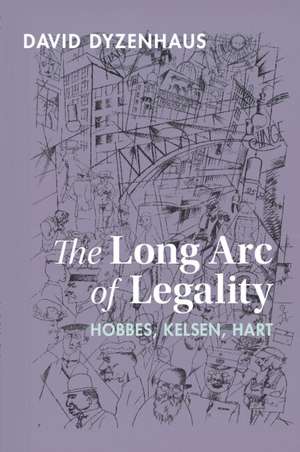The Long Arc of Legality: Hobbes, Kelsen, Hart
Autor David Dyzenhausen Limba Engleză Paperback – 29 mar 2023
| Toate formatele și edițiile | Preț | Express |
|---|---|---|
| Paperback (1) | 232.88 lei 3-5 săpt. | +24.95 lei 6-12 zile |
| Cambridge University Press – 29 mar 2023 | 232.88 lei 3-5 săpt. | +24.95 lei 6-12 zile |
| Hardback (1) | 352.93 lei 6-8 săpt. | |
| Cambridge University Press – 26 ian 2022 | 352.93 lei 6-8 săpt. |
Preț: 232.88 lei
Nou
Puncte Express: 349
Preț estimativ în valută:
44.56€ • 46.62$ • 37.02£
44.56€ • 46.62$ • 37.02£
Carte disponibilă
Livrare economică 13-27 martie
Livrare express 26 februarie-04 martie pentru 34.94 lei
Preluare comenzi: 021 569.72.76
Specificații
ISBN-13: 9781009048866
ISBN-10: 1009048864
Pagini: 489
Dimensiuni: 229 x 151 x 31 mm
Greutate: 0.65 kg
Editura: Cambridge University Press
Colecția Cambridge University Press
Locul publicării:Cambridge, United Kingdom
ISBN-10: 1009048864
Pagini: 489
Dimensiuni: 229 x 151 x 31 mm
Greutate: 0.65 kg
Editura: Cambridge University Press
Colecția Cambridge University Press
Locul publicării:Cambridge, United Kingdom
Cuprins
1. The Puzzle of Very Unjust Law I: Hart and Dworkin; 2. The Puzzle of Very Unjust Law II: Hobbes; 3. The Constitution of Legal Authority/The Authority of Legal Constitutions; 4. The Janus-Faced Constitution; 5. The Politics of Legal Space; 6. Legality's Promise; Appendix I. Exclusive and Inclusive Legal Positivism; Appendix II. Kantian Private Law Theory; Appendix III. John Finnis and 'Schmittean Logic'.
Recenzii
'Just when many legal philosophers were inclined to give in and accept the view long held by most other philosophers and legal theorists that the traditional debate about the nature of law was stalled in sectarian squabbling and anyway of dubious importance, David Dyzenhaus's magnificent book will have us starting all over again. In this creative and original rereading of the main texts, especially those of Hobbes, Hart, and Kelsen, Dyzenhaus brings the subject, and its importance, to life again. His interpretations of all three authors are controversial, but the book is the more interesting and generative for that. Dyzenhaus orchestrates a lively engagement among his predecessors-on his terms, not theirs-and an original and important theory of legal authority emerges organically in the process.' Liam Murphy, Professor of Law, Philosophy, New York University
'How the social fact of power is transformed into the normative relationship of authority is a genuine and deep puzzle in the philosophy of law. Dyzenhaus traces how legal positivists, starting with Hobbes, have attended to the way in which the law maintains a relationship of mutual respect and accountability between ruler and subject. His provocative claim is that 'long arc of legality' from Hobbes through Kelsen to Hart reveals the ways in which legal positivists have subtly incorporated insights from their major critics – the natural lawyers – to answer the question of how law can have legitimate authority for its subjects. Through careful analysis of their contributions, he develops a distinctive account of the authority of law, capable of answering the question, 'But, how can that be law for me?'' W. Bradley Wendel, Edwin H. Woodruff Professor of Law, Cornell Law School
'There are few works in contemporary legal philosophy that match its standards of quality and innovation. Dyzenhaus's book combines the virtues of originality and insight, which are typical of authors like Dworkin and Raz, with the equally important virtues of discipline, sensitivity to historical context, interdisciplinarity, and generosity in the interpretation of other authors …' Thomas Bustamante, JOTWELL
'How the social fact of power is transformed into the normative relationship of authority is a genuine and deep puzzle in the philosophy of law. Dyzenhaus traces how legal positivists, starting with Hobbes, have attended to the way in which the law maintains a relationship of mutual respect and accountability between ruler and subject. His provocative claim is that 'long arc of legality' from Hobbes through Kelsen to Hart reveals the ways in which legal positivists have subtly incorporated insights from their major critics – the natural lawyers – to answer the question of how law can have legitimate authority for its subjects. Through careful analysis of their contributions, he develops a distinctive account of the authority of law, capable of answering the question, 'But, how can that be law for me?'' W. Bradley Wendel, Edwin H. Woodruff Professor of Law, Cornell Law School
'There are few works in contemporary legal philosophy that match its standards of quality and innovation. Dyzenhaus's book combines the virtues of originality and insight, which are typical of authors like Dworkin and Raz, with the equally important virtues of discipline, sensitivity to historical context, interdisciplinarity, and generosity in the interpretation of other authors …' Thomas Bustamante, JOTWELL
Notă biografică
Descriere
Explores how the central question of philosophy of law is the legal subject's: how can that be law for me?
